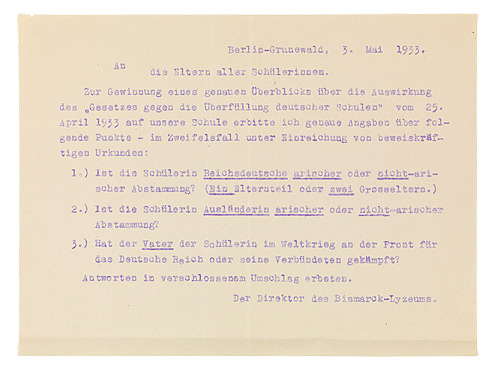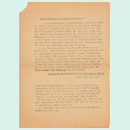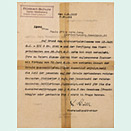Wednesday
3 May 1933
Letter from the Bismarck Lyceum to parents requesting proof of descent
The law was ostensibly adopted to restrict the number of students at schools and to adapt the number of university students to the general demand. However, Section 4 reveals a very different purpose. It states that in the case of new admissions, the number of Jewish students at a school may not exceed the number proportionate to the percentage of Jews in the German population. In an implementing regulation issued the same day, this share was specified to be 1.5 percent. However, there were a number of exceptions to the rule: as in the case of the Law for the Restoration of the Professional Civil Service, the descendants of frontline soldiers in the First World War had special status. In addition, the children of interfaith marriages were not to be taken into account "when calculating the quota."
In order to determine the percentage of Jewish girls at his school, the principal of the Bismarck Lyceum was forced to gather information about his students by means of a circular letter. Parents were asked whether their daughters were of Aryan or non-Aryan descent, whether they had German or foreign citizenship and whether their fathers had fought at the front in the First World War. Under the new law, Honoria Plesch was considered a "German of non-Aryan descent."
The letter from his daughter‘s school was not the first blow for János Plesch. Although the Hungarian-born professor of medicine had taken on German citizenship in 1910 and converted to Catholicism shortly before, he had been dismissed from his public positions immediately after the enactment of the Civil Service Restoration Law. The fact that he had served as a doctor in the German army during the First World War was not taken into account. Now the laws were also targeting his children.
As a result Professor Plesch decided to leave Germany and in June 1933 he emigrated to England with his family. There Honoria Plesch was able to continue her education and later became a respected costume designer.
Ulrike Neuwirth



